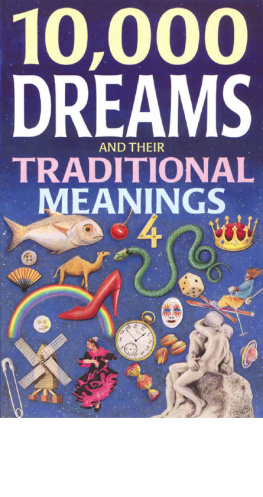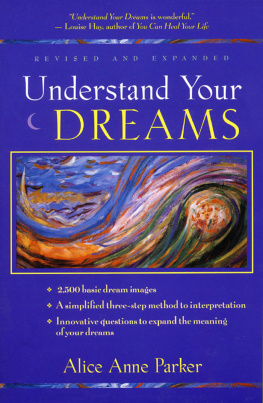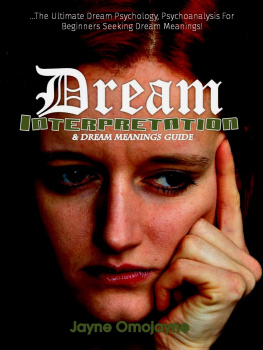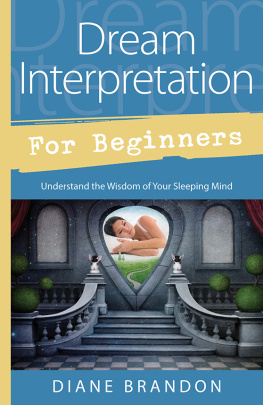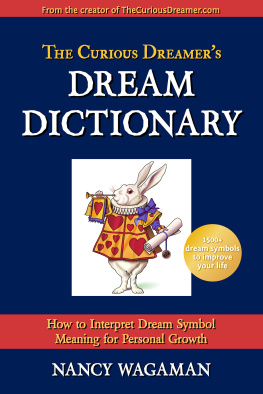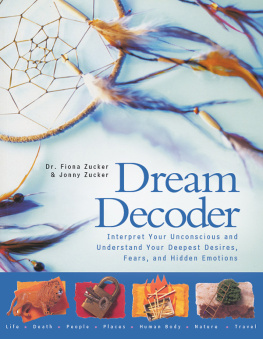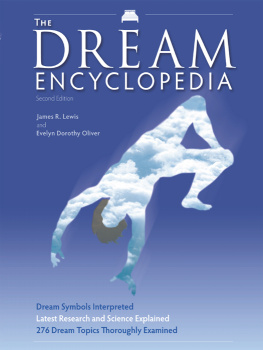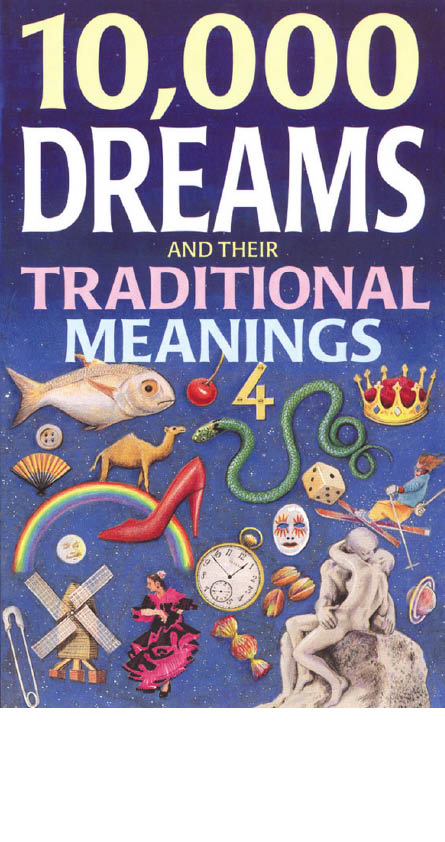Copyright 1995 and 2012 W. Foulsham & Co. Ltd
The Copyright Act prohibits (subject to certain very limited exceptions) the making of copies of any copyright work or of a substantial part of such a work, including the making of copies by photocopying or similar process. Written permission to make a copy or copies must therefore normally be obtained from the publisher in advance. It is advisable also to consult the publisher if in any doubt as to the legality of any copyright which is to be undertaken.
W. Foulsham & Co. Ltd
Preface
Dreams are rudiments of the great state to come. We dream what is about to happen. BAILEY.
The Bible, as well as other great books of historical and revealed religion, shows traces of a general and substantial belief in dreams. Plato, Goethe, Shakespeare and Napoleon assigned to certain dreams prophetic value. Joseph saw eleven stars of the Zodiac bow to himself, the twelfth star. The famine of Egypt was revealed by a vision of fat and lean cattle. The parents of Christ were warned of the cruel edict of Herod, and fled with the Divine Child into Egypt.
Pilates wife, through the influence of a dream, advised her husband to have nothing to do with the conviction of Christ. But the gross materialism of the day laughed at dreams, as it echoed the voice and verdict of the multitude, Crucify the Spirit, but let the flesh live. Barabbas, the robber, was set at liberty.
The ultimatum of all human decrees and wisdom is to gratify the passions of the flesh at the expense of the spirit The prophets and those who have stood nearest the fountain of universal knowledge used dreams with more frequency than any other mode of divination.
Profane, as well as sacred, history is threaded with incidents of dream prophecy. Ancient history relates that Gennadius was convinced of the immortality of his soul by conversing with an apparition in his dream.
Through the dream of Cecilia Metella, the wife of a Consul, the Roman Senate was induced to order the temple of Juno Sospita rebuilt.
The Emperor Mardan dreamed he saw the bow of the Hunnish conqueror break on the same night that Attila died.
Plutarch relates how Augustus, while ill, through the dream of a friend, was persuaded to leave his tent, which a few hours after was captured by the enemy, and the bed whereon he had lain was pierced with the enemies swords.
If Julius Caesar had been less incredulous about dreams he would have listened to the warning which Calpurnia, his wife, received in a dream.
Croesus saw his son killed in a dream.
Petrarch saw his beloved Laura, in a dream, on the day she died, after which he wrote his beautiful poem, The Triumph of Death.
Cicero relates the story of two traveling Arcadians who went to different lodgingsone to an inn, and the other to a private house. During the night the latter dreamed that his friend was begging for help. The dreamer awoke; but, thinking the matter unworthy of notice, went to sleep again. The second time he dreamed his friend appeared, saying it would be too late, for he had already been murdered and his body hid in a cart, under manure. The cart was afterward sought for and the body found. Cicero also wrote, If the gods love men they will certainly disclose their purposes to them in sleep.
Chrysippus wrote a volume on dreams as divine portent He refers to the skilled interpretations of dreams as a true divination; but adds that, like all other arts in which men have to proceed on conjecture and on artificial rules, it is not infallible.
Plato concurred in the general idea prevailing in his day, that there were divine manifestations to the soul in sleep. Con-dorcet thought and wrote with greater fluency in his dreams than in waking life.
Tartini, a distinguished violinist, composed his Devils Sonata under the inspiration of a dream. Coleridge, through dream influence, composed his Kubla Khan.
The writers of Greek and Latin classics relate many instances of dream experiences. Homer accorded to some dreams divine origin. During the third and fourth centuries, the supernatural origin of dreams was so generally accepted that the fathers, relying upon the classics and the Bible as authority, made this belief a doctrine of the Christian Church.
Synesius placed dreaming above all methods of divining the future; he thought h the surest, and open to the poor and rich alike
Aristotle wrote: There is a divination concerning some thing in dreams not incredible. Camille Flammarion, in his great book on Premonitory Dreams and Divination of the Future, says: I do not hesitate to affirm at the outset that occurrence of dreams foretelling future events with accuracy must be accepted as certain.
Joan of Arc predicted her death.
Cazotte, the French philosopher and transcendentalism warned Condorcet against the manner of his death.
People dream now, the same as they did in medieval and ancient times.
The following excerpt from The Unknown, a recent book by Flammarion, the French astronomer, supplemented with a few of my own thoughts and collections, will answer the purposes intended for this book.
We may see without eyes and hear without ears, not by unnatural excitement of our sense of vision or of hearing, for these accounts prove the contrary, but by some interior sense, psychic and mental.
The soul, by its interior vision, may see not only what is passing at a great distance, but it may also know in advance what is to happen in the future. The future exists potentially, determined by causes which bring to pass successive events.
POSITIVE OBSERVATION PROVES THE EXISTENCE OF A PSYCHIC WORLD, as real as the world known to our physical senses.
And now, because the soul acts at a distance by some power that belongs to it, are we authorized to conclude that it exists as something real, and that it is not the result of functions of the brain?
Does light really exist?
Does heat exist?
Does sound exist?
No.
They are only manifestations produced by movement
What we call light is a sensation produced upon our optfe nerve by the vibrations of ether, comprising between 400 and 756 trillions per second, undulations that are themselves very obscure.
What we call heat is a sensation produced by vibrations between 350 and and 600 trillions.
The sun lights up space, as much at midnight as at midday. Its temperature is nearly 270 degrees below zero.
What we call sound is a sensation produced upon our auditory nerve by silent vibrations of the air, themselves comprising between 32,000 and 36,000 a second.
Very many scientific terms represent only results, not causes.
The soul may be in the same case.
The observations given in this work, the sensations, the impressions, the visions, things heard, etc, may indicate physical effects produced without the brain.
Yes, no doubt, but it does not seem so.
Let us examine one instance.
A young woman, adored by her husband, dies at Moscow. Her father-in-law, at Pulkowo, near St Petersburg, saw her that same hour by bis side. She walked with him along the street; then she disappeared. Surprised, startled, and terrified, he telegraphed to his son, and learned both the sickness and the death of his daughter-in-law.

